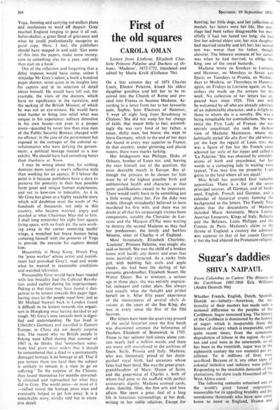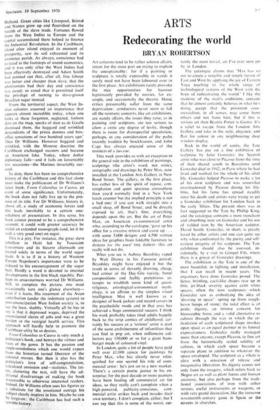Sugar's daddies
SHIVA NAIPAUL
From Columbus to Castro: The History of the Caribbean 1492-1969 Eric Williams (Andre Deutsch 90s) Whether French, English, Dutch, Spanish, Danish or—latterly—American, the na- tionality of their masters has made only a notional difference to the peoples of the , Caribbean. Sugar remained king. The history of the Caribbean is dominated by the history of sugar; which is inseparable from the history of slavery; which is inseparable, until quite recent times, from the systematic degradation of labour in the region. As cot- ton and coal were in the nineteenth, as oil has been in the twentieth, sugar was in the eighteenth century the raw material par ex- cellence. To it millions of lives were sacrificed. Because of it, any other signs of colonial initiative and industry were stifled. Responding to the insatiable demands of the plantations, the slave trade blossomed off the West Africa coast.
The following centuries witnessed one of the world's great forced migrations, memorable for its appalling brutality and the unwelcome thousands who have now come home to roost in England, France and Holland. Great cities like Liverpool, Bristol and Nantes grew up and flourished on the wealth of the slave trade. Fortunes flowed from the West Indies to Europe and the capital accumulated there helped to. finance the Industrial Revolution. In the Caribbean, island after island enjoyed its moment of prosperity, saw its soil exhausted and its eminence perish. As always, conscience had to tread in the footsteps of sound economics, and it was only after the West Indies had been effectively destroyed and Adam Smith had pointed out that, after all, free labour was better and cheaper than slave, that the abolitionists had their day and conscience was eased; so eased that it permitted itself the privilege of turning to slave-grown Brazilian sugar instead.
From the territorial aspect, the West In- dian colonies assumed an importance that appears almost incredible today, when one looks at these forgotten, neglected, forlorn dots on the map, specks of dust as de Gaulle dismissed them, the haggard and wrinkled. descendants of the prima donnas and box- office sensations of two hundred years ago.' Thus Dr Williams. However haggard and wrinkled, with the Monroe doctrine the Caribbean exchanged masters and became an American lake. Today, where dollar diplomacy fails—and it fails on lamentably few occasions—the Marines invariably suc- ceed.
To date, there has been no comprehensive history of the Caribbean and this fact alone must make the publication of Dr Williams's latest book, From Columbus to Castro, an event of some significance. Unfortunately, the book does not fully live up to the pro- mise of its title. For Dr Williams, history is, above all, a study of economic forces and this leads inevitably to a certain one- sidedness of presentation. In this sense, his book cannot pretend to be a comprehensive account; it could with greater accuracy be styled an extended monograph (and, let it be said, a very good one) on sugar.
This is a pity. For instance, the great slave rebellion in Haiti led by Toussaint Louverture and its bizarre aftermath are treated solely in terms of the world sugar trade. It is as if in a history of Western Europe Napoleon's importance were to be reduced to his encouragement of .the sugar beet. Hardly a word is devoted to internal developments in the first black republic. Per- haps its unsavouriness worried Dr Williams. Still, to complete the picture, one must occasionally turn one's glance elsewhere— even if it hurts. His treatment of the Asian contribution (under the indenture system) to post-emancipation West Indian society is, to say the least, shabby. Virtually all he has to say is that it depressed wages, deprived the emancipated slaves of jobs and was a great burden to the vestigial health service. This approach will hardly help to promote the ( aribbean unity he so desires. Front Columbus to-Castro is very much a politician's book, and betrays the virtues and vices of the genre. It has the passion and single-mindedness which one would expect from the historian turned liberator of the colonial masses. But then it also has the politician's love of self-congratulation, calculated omission and—statistics. The lat- ter, cluttering the text, will have the ad- ditional disadvantage of making the book inaccessible to otherwise interested readers. Indeed, Dr Williams often uses his figures as a substitute for the emotional outrage his subject clearly inspires in him. Maybe he can be forgiven: the Caribbean has had such a terrible history.



































 Previous page
Previous page